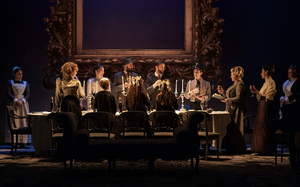Review: LEOPOLDSTADT, Wyndham's Theatre
|
![]() Tom Stoppard's latest - and possibly final - play has few of the dramatic hallmarks you might expect from him: the dazzling linguistic flourishes, the formal trickery, the knotty metaphors and giddy metatheatricality. Instead, we have a relatively straightforward, linear piece, initially overburdened by information, but with an immense accumulative power that leaves audiences awed and tearful.
Tom Stoppard's latest - and possibly final - play has few of the dramatic hallmarks you might expect from him: the dazzling linguistic flourishes, the formal trickery, the knotty metaphors and giddy metatheatricality. Instead, we have a relatively straightforward, linear piece, initially overburdened by information, but with an immense accumulative power that leaves audiences awed and tearful.
 This is, not coincidentally, a deeply personal work for Stoppard. It follows four generations of an extended Jewish family in Vienna, from affluence in 1899 through to 1955, in the aftermath of the Holocaust's unthinkable horror. Their history echoes Stoppard's own: his Czech family, the Strausslers, fled German invasion. Tom Stoppard eventually made it to England, and was remade as an erudite Englishman.
This is, not coincidentally, a deeply personal work for Stoppard. It follows four generations of an extended Jewish family in Vienna, from affluence in 1899 through to 1955, in the aftermath of the Holocaust's unthinkable horror. Their history echoes Stoppard's own: his Czech family, the Strausslers, fled German invasion. Tom Stoppard eventually made it to England, and was remade as an erudite Englishman.
It was only recently that Stoppard learned of his full family history, and began to grapple with his Jewish heritage and the fact that many of his relatives perished in Nazi concentration camps. Once in England, his mother had decided to "draw a blind" over her former life, as Stoppard explains in his programme essay.
The Merz clan is a clearly fictionalised version, but with echoes of this discovered past. It's headed by Jewish textile magnate Hermann, who married Catholic Gretl; their children handle this dual identity with aplomb, placing a Star of David on top of their Christmas tree.
Religious difference is a source of wry humour - "Poor boy, baptized and circumcised in the same week!" sighs Caroline Gruber's scene-stealing grandmother - and, at the turn of the century, the family has a casual upper-middle-class status: waited upon by servants, their home furnished with a grand piano and vast chandelier (beautiful design from Richard Hudson).
As the years pass, we see both their home and their status stripped away, until they are left in a dark, empty room, huddled in coats for warmth, and with evil descending upon them. Between scenes, Adam Cork's soundscape and Isaac Madge's projections fill in the gaps - indelible, both, pairing the breaking of glass and shouts of a mob with haunting archival images - while Neil Austin's lighting plunges them into the gloom.
The play's first half lacks that direct, emotive power. There's so much exposition - almost always from a pontificating man, while women handle the domestic stuff - that it resembles a lecture series. Equally, discussions around Freudian or political theory, the issues of Palestine and the promised land, or prejudice towards Jews in Austria, despite Emperor Joseph I granting them equal rights, are rich and enlightening, but too evidently placed in the mouths of characters.
With a mammoth cast (including small children) and several generations of the family to contend with, it's also difficult to remember exactly who is who and where they fit in - let alone fully engage with someone's arc through the show. Director Patrick Marber effectively marshalls the busy ensemble segments, giving a vivid impression of a big, loving family talking over one another and coming together for important moments, and makes sure the gags land perfectly (two words: cigar cutter), but could do more to enliven the static speeches and debates.
However, stick with those heftier sections, because the second half grips hold of you and demands you bear witness. It is stark, simply told, and unbearably moving. At the beginning of the play, matriarch Emilia spoke of how forgetting the names of those in old photograph albums equated to something like a second death. The Merz family, and so many millions of others lost to the genocide of the Holocaust, cannot be saved, but they must never be forgotten. Stoppard's work here ensures that.
Among a strong ensemble cast, Adrian Scarborough makes the biggest impression as pragmatic businessman Hermann, whose eagerness to assimilate gradually curdles, along with Faye Castelow as his restless wife Gretl, and Ed Stoppard's academic, who clings to mathematical logic in the face of bigoted persecution. The trio of Sebastian Armesto, Jenna Augen and Luke Thallon handle the complicated 1950s cross-currents - including what feels like Stoppard interrogating his own adopted British identity - with supreme delicacy.
The play also benefits from current events. This is not just an historic discussion, but an urgently contemporary one, given the rise of anti-Semitism and nationalism, and our shameful treatment of refugees - so a more sober dramatic treatment is, perhaps, appropriate. Of course we should learn, or relearn, these lessons of history, and so much the better if such a deeply felt play moves those ideas from abstract numbers and theories to people, faces, a palpable and shattering loss.
For some, no such translation is needed. My brother is in the midst of researching our own family tree, and in one mid-20th-century section - our Czech-Jewish ancestors - there is a cluster of brutally snapped branches, just like those of the Merzes, the Strausslers, and so many others. The play's climactic tableau is a haunting, a summoning of ghosts suddenly bathed in light. They are summoned by remembrance, and it is through remembrance that we can - we must - keep that light burning.
Leopoldstadt at Wyndham's Theatre until 13 June
Photo credit: Marc Brenner
Add Your Comment
Videos
